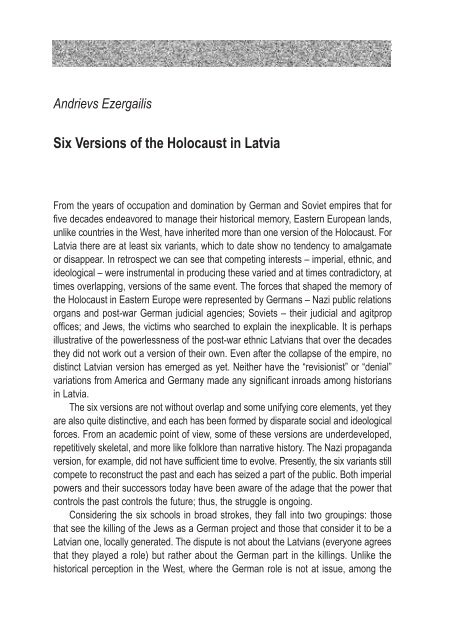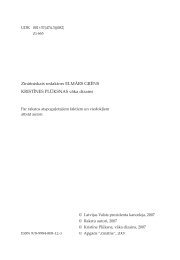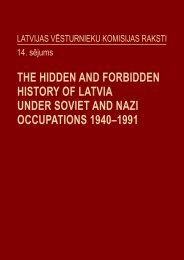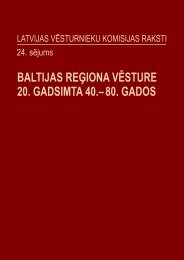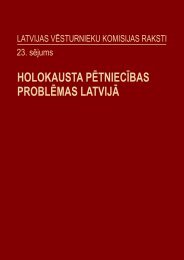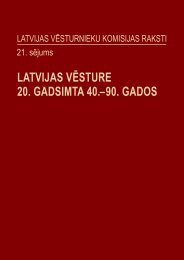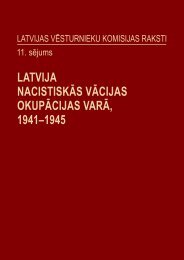- Page 1:
LATVIJAS VĒSTURNIEKU KOMISIJAS RAK
- Page 4 and 5:
Latvijas Vēsturnieku komisija Latv
- Page 6 and 7:
SATURS Priekšvārds . . . . . . .
- Page 8 and 9:
Saturs Eva Treiģe-Treide, Ēriks P
- Page 10 and 11:
PRIEKŠVĀRDS Konferenču referāti
- Page 12 and 13:
2004. GADA 3.-4. JŪNIJA KONFERENCE
- Page 14 and 15:
Aivars Stranga Holokausta vēstures
- Page 16 and 17: Aivars Stranga. Holokausta vēsture
- Page 18 and 19: Aivars Stranga. Holokausta vēsture
- Page 20 and 21: Aivars Stranga. Holokausta vēsture
- Page 22 and 23: Aivars Stranga. Holokausta vēsture
- Page 24 and 25: Aivars Stranga. Holokausta vēsture
- Page 26 and 27: Aivars Stranga. Holokausta vēsture
- Page 28 and 29: Aivars Stranga. Holokausta vēsture
- Page 30 and 31: Aivars Stranga. Holokausta vēsture
- Page 32 and 33: Aivars Stranga. Holokausta vēsture
- Page 34 and 35: Emmanuel Zingeris Reports on the Na
- Page 36 and 37: Emmanuel Zingeris. Reports on the N
- Page 38 and 39: Emmanuel Zingeris. Reports on the N
- Page 40 and 41: Andrievs Ezergailis. Knowledge of t
- Page 42 and 43: Andrievs Ezergailis. Knowledge of t
- Page 44 and 45: Andrievs Ezergailis. Knowledge of t
- Page 46 and 47: Andrievs Ezergailis. Knowledge of t
- Page 48 and 49: Andrievs Ezergailis. Knowledge of t
- Page 50 and 51: Josifs Ročko Ebreju iznīcināšan
- Page 52 and 53: Josifs Ročko. Ebreju iznīcināša
- Page 54 and 55: Josifs Ročko. Ebreju iznīcināša
- Page 56 and 57: Josifs Ročko. Ebreju iznīcināša
- Page 58 and 59: Josifs Ročko. Ebreju iznīcināša
- Page 60 and 61: Josifs Ročko. Ebreju iznīcināša
- Page 62 and 63: Josifs Ročko. Ebreju iznīcināša
- Page 64 and 65: PĒTĪJUMI PAR HOLOKAUSTA PROBLĒM
- Page 68 and 69: Andrievs Ezergailis. Six Versions o
- Page 70 and 71: Andrievs Ezergailis. Six Versions o
- Page 72 and 73: Andrievs Ezergailis. Six Versions o
- Page 74 and 75: Andrievs Ezergailis. Six Versions o
- Page 76 and 77: Andrievs Ezergailis. Six Versions o
- Page 78 and 79: Andrievs Ezergailis. Six Versions o
- Page 80 and 81: Andrievs Ezergailis. Six Versions o
- Page 82 and 83: Andrievs Ezergailis. Six Versions o
- Page 84 and 85: Grigorijs Smirins Rīgas ebreji nac
- Page 86 and 87: Grigorijs Smirins. Rīgas ebreji na
- Page 88 and 89: Grigorijs Smirins. Rīgas ebreji na
- Page 90 and 91: Grigorijs Smirins. Rīgas ebreji na
- Page 92 and 93: Grigorijs Smirins. Rīgas ebreji na
- Page 94 and 95: Grigorijs Smirins. Rīgas ebreji na
- Page 96 and 97: Grigorijs Smirins. Rīgas ebreji na
- Page 98 and 99: Grigorijs Smirins. Rīgas ebreji na
- Page 100 and 101: Grigorijs Smirins. Rīgas ebreji na
- Page 102 and 103: Grigorijs Smirins. Rīgas ebreji na
- Page 104 and 105: Grigorijs Smirins. Rīgas ebreji na
- Page 106 and 107: Grigorijs Smirins. Rīgas ebreji na
- Page 108 and 109: Grigorijs Smirins. Rīgas ebreji na
- Page 110 and 111: Grigorijs Smirins. Rīgas ebreji na
- Page 112 and 113: Grigorijs Smirins. Rīgas ebreji na
- Page 114 and 115: Grigorijs Smirins. Rīgas ebreji na
- Page 116 and 117:
Grigorijs Smirins. Rīgas ebreji na
- Page 118 and 119:
Grigorijs Smirins. Rīgas ebreji na
- Page 120 and 121:
Aigars Urtāns. Ebreju tautības ci
- Page 122 and 123:
Aigars Urtāns. Ebreju tautības ci
- Page 124 and 125:
Aigars Urtāns. Ebreju tautības ci
- Page 126 and 127:
Aigars Urtāns. Ebreju tautības ci
- Page 128 and 129:
Aigars Urtāns. Ebreju tautības ci
- Page 130 and 131:
Aigars Urtāns. Ebreju tautības ci
- Page 132 and 133:
Aigars Urtāns. Ebreju tautības ci
- Page 134 and 135:
Aigars Urtāns. Ebreju tautības ci
- Page 136 and 137:
Aigars Urtāns. Ebreju tautības ci
- Page 138 and 139:
Eva Treiģe-Treide, Ēriks Prokopov
- Page 140 and 141:
Eva Treiģe-Treide, Ēriks Prokopov
- Page 142 and 143:
Eva Treiģe-Treide, Ēriks Prokopov
- Page 144 and 145:
Eva Treiģe-Treide, Ēriks Prokopov
- Page 146 and 147:
Eva Treiģe-Treide, Ēriks Prokopov
- Page 148 and 149:
Eva Treiģe-Treide, Ēriks Prokopov
- Page 150 and 151:
Eva Treiģe-Treide, Ēriks Prokopov
- Page 152 and 153:
Eva Treiģe-Treide, Ēriks Prokopov
- Page 154 and 155:
Eva Treiģe-Treide, Ēriks Prokopov
- Page 156 and 157:
Eva Treiģe-Treide, Ēriks Prokopov
- Page 158 and 159:
Eva Treiģe-Treide, Ēriks Prokopov
- Page 160 and 161:
Eva Treiģe-Treide, Ēriks Prokopov
- Page 162 and 163:
Eva Treiģe-Treide, Ēriks Prokopov
- Page 164 and 165:
Andris Tomašūns. Jelgavā nogalin
- Page 166 and 167:
Andris Tomašūns. Jelgavā nogalin
- Page 168 and 169:
Andris Tomašūns. Jelgavā nogalin
- Page 170 and 171:
Andris Tomašūns. Jelgavā nogalin
- Page 172 and 173:
Andris Tomašūns. Jelgavā nogalin
- Page 174 and 175:
Andris Tomašūns. Jelgavā nogalin
- Page 176 and 177:
Andris Tomašūns. Jelgavā nogalin
- Page 178 and 179:
Andris Tomašūns. Jelgavā nogalin
- Page 180 and 181:
Andris Tomašūns. Jelgavā nogalin
- Page 182 and 183:
Andris Tomašūns. Jelgavā nogalin
- Page 184 and 185:
Andris Tomašūns. Jelgavā nogalin
- Page 186 and 187:
Dzintars Ērglis Holokausts Krustpi
- Page 188 and 189:
Dzintars Ērglis. Holokausts Krustp
- Page 190 and 191:
Dzintars Ērglis. Holokausts Krustp
- Page 192 and 193:
Dzintars Ērglis. Holokausts Krustp
- Page 194 and 195:
Dzintars Ērglis. Holokausts Krustp
- Page 196 and 197:
Dzintars Ērglis. Holokausts Krustp
- Page 198 and 199:
Dzintars Ērglis. Holokausts Krustp
- Page 200 and 201:
Dzintars Ērglis. Holokausts Krustp
- Page 202 and 203:
Dzintars Ērglis. Holokausts Krustp
- Page 204 and 205:
Dzintars Ērglis. Holokausts Krustp
- Page 206 and 207:
Dzintars Ērglis. Holokausts Krustp
- Page 208 and 209:
Dzintars Ērglis. Holokausts Krustp
- Page 210 and 211:
Avots: LVA, 1986. f., 1. apr., 3927
- Page 212 and 213:
Dzintars Ērglis. Holokausts Krustp
- Page 214 and 215:
Dzintars Ērglis. Holokausts Krustp
- Page 216 and 217:
Dzintars Ērglis. Holokausts Krustp
- Page 218 and 219:
Rudīte Vīksne Holokausts Latvijas
- Page 220 and 221:
Rudīte Vīksne. Holokausts Latvija
- Page 222 and 223:
Rudīte Vīksne. Holokausts Latvija
- Page 224 and 225:
Rudīte Vīksne. Holokausts Latvija
- Page 226 and 227:
Rudīte Vīksne. Holokausts Latvija
- Page 228 and 229:
Rudīte Vīksne. Holokausts Latvija
- Page 230 and 231:
Rudīte Vīksne. Holokausts Latvija
- Page 232 and 233:
Rudīte Vīksne. Holokausts Latvija
- Page 234 and 235:
Rudīte Vīksne. Holokausts Latvija
- Page 236 and 237:
Rudīte Vīksne. Holokausts Latvija
- Page 238 and 239:
NOVADPĒTNIEKA VĀKUMS COLLECTION O
- Page 240 and 241:
Uldis Lasmanis Holokausts Viesītes
- Page 242 and 243:
Uldis Lasmanis. Holokausts Viesīte
- Page 244 and 245:
Uldis Lasmanis. Holokausts Viesīte
- Page 246 and 247:
Uldis Lasmanis. Holokausts Viesīte
- Page 248 and 249:
Uldis Lasmanis. Holokausts Viesīte
- Page 250 and 251:
Uldis Lasmanis. Holokausts Viesīte
- Page 252 and 253:
Uldis Lasmanis. Holokausts Viesīte
- Page 254 and 255:
Uldis Lasmanis. Holokausts Viesīte
- Page 256 and 257:
Uldis Lasmanis. Holokausts Viesīte
- Page 258 and 259:
Uldis Lasmanis. Holokausts Viesīte
- Page 260 and 261:
Uldis Lasmanis. Holokausts Viesīte
- Page 262 and 263:
Uldis Lasmanis. Holokausts Viesīte
- Page 264 and 265:
Uldis Lasmanis. Holokausts Viesīte
- Page 266 and 267:
Uldis Lasmanis. Holokausts Viesīte
- Page 268 and 269:
Uldis Lasmanis. Holokausts Viesīte
- Page 270 and 271:
Uldis Lasmanis. Holokausts Viesīte
- Page 272 and 273:
Uldis Lasmanis. Holokausts Viesīte
- Page 274 and 275:
Uldis Lasmanis Holokausts Jēkabpil
- Page 276 and 277:
Uldis Lasmanis. Holokausts Jēkabpi
- Page 278 and 279:
Uldis Lasmanis. Holokausts Jēkabpi
- Page 280 and 281:
Uldis Lasmanis. Holokausts Jēkabpi
- Page 282 and 283:
Uldis Lasmanis. Holokausts Jēkabpi
- Page 284 and 285:
Uldis Lasmanis. Holokausts Jēkabpi
- Page 286 and 287:
Uldis Lasmanis. Holokausts Jēkabpi
- Page 288 and 289:
Uldis Lasmanis. Holokausts Jēkabpi
- Page 290 and 291:
Uldis Lasmanis. Holokausts Jēkabpi
- Page 292 and 293:
Uldis Lasmanis. Holokausts Jēkabpi
- Page 294 and 295:
Uldis Lasmanis. Holokausts Jēkabpi
- Page 296 and 297:
Uldis Lasmanis. Holokausts Jēkabpi
- Page 298 and 299:
Uldis Lasmanis. Holokausts Jēkabpi
- Page 300 and 301:
Uldis Lasmanis. Holokausts Jēkabpi
- Page 302 and 303:
Uldis Lasmanis. Holokausts Jēkabpi
- Page 304 and 305:
Uldis Lasmanis. Holokausts Jēkabpi
- Page 306 and 307:
Uldis Lasmanis. Holokausts Jēkabpi
- Page 308 and 309:
Uldis Lasmanis. Holokausts Jēkabpi
- Page 310 and 311:
Uldis Lasmanis. Holokausts Jēkabpi
- Page 312 and 313:
Elmāra Rivoša atmiņas HOLOKAUSTU
- Page 314 and 315:
Elmāra Rivoša atmiņas Elmāra Ri
- Page 316 and 317:
Elmāra Rivoša atmiņas Sācies N
- Page 318 and 319:
Elmāra Rivoša atmiņas kādreiz n
- Page 320 and 321:
Elmāra Rivoša atmiņas un garasp
- Page 322 and 323:
Elmāra Rivoša atmiņas kolonna za
- Page 324 and 325:
Elmāra Rivoša atmiņas Sadists iz
- Page 326 and 327:
Elmāra Rivoša atmiņas Izejam pa
- Page 328 and 329:
Elmāra Rivoša atmiņas * Aizmirsi
- Page 330 and 331:
Elmāra Rivoša atmiņas attēloja
- Page 332 and 333:
Elmāra Rivoša atmiņas gan aukstu
- Page 334 and 335:
Elmāra Rivoša atmiņas Mūsu ista
- Page 336 and 337:
Elmāra Rivoša atmiņas darbs ir g
- Page 338 and 339:
Elmāra Rivoša atmiņas * Mūsu gr
- Page 340 and 341:
Elmāra Rivoša atmiņas Stāvam ar
- Page 342 and 343:
Elmāra Rivoša atmiņas Beidzot v
- Page 344 and 345:
Elmāra Rivoša atmiņas Paretam pi
- Page 346 and 347:
Elmāra Rivoša atmiņas ir beigusi
- Page 348 and 349:
Elmāra Rivoša atmiņas gaudot un
- Page 350 and 351:
Elmāra Rivoša atmiņas vairījās
- Page 352 and 353:
Elmāra Rivoša atmiņas * Paziņu
- Page 354 and 355:
Elmāra Rivoša atmiņas * “Organ
- Page 356 and 357:
Elmāra Rivoša atmiņas jamas”.
- Page 358 and 359:
Elmāra Rivoša atmiņas SSP ir vie
- Page 360 and 361:
Elmāra Rivoša atmiņas Avīzēs p
- Page 362 and 363:
Elmāra Rivoša atmiņas Mimi sapn
- Page 364 and 365:
Elmāra Rivoša atmiņas iesaistīt
- Page 366 and 367:
Elmāra Rivoša atmiņas eksistē a
- Page 368 and 369:
Elmāra Rivoša atmiņas No mūsu d
- Page 370 and 371:
Elmāra Rivoša atmiņas * Atkal n
- Page 372 and 373:
Elmāra Rivoša atmiņas vietu labu
- Page 374 and 375:
Elmāra Rivoša atmiņas Žanis ar
- Page 376 and 377:
Elmāra Rivoša atmiņas komandas u
- Page 378 and 379:
Elmāra Rivoša atmiņas 42 Domāta
- Page 380 and 381:
Elmāra Rivoša atmiņas 68 Mauzeri
- Page 382 and 383:
Elmāra Rivoša atmiņas 89 Schutzm
- Page 384 and 385:
Elmāra Krājuma Rivoša rakstu atm


